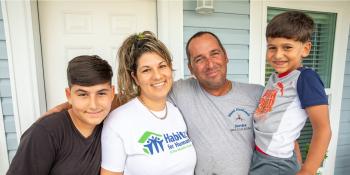Hurricane Irma recovery in Florida
Affordability was an ongoing struggle in the Florida communities devastated by Hurricane Irma before the storm wiped out much of the affordable housing stock in 2017.
Two years later, residents still are rebuilding, many living with relatives or crowding into what rental space they can find while they await repairs or completion and purchase of a Habitat for Humanity home.
In the time since the storm, we have been hard at work helping families build or repair safe, affordable homes across the state in areas hit by Irma and providing disaster-related services to affected families as well. In addition to the ongoing recovery work, Habitat is investing in disaster preparedness at the community level to build resilience for the future. We are building back stronger through the Insurance Institute for Business and Home Safety’s FORTIFIED Home program for resiliency, partnering with local agencies, and offering homeownership education, which includes information about the importance of insurance, how to identify licensed and insured contractors, and general home maintenance.
The goal of all of this is resilience for families like Junior and Leta’s, whose home of 36 years was destroyed by Irma in Marathon, on the Florida Keys. The hurricane affected nearly 100% of the homes in their area, with 40% requiring major repairs or complete rebuilds. Like many other Habitat affiliates in the affected areas, Habitat for Humanity of the Middle Keys continues to complete critical repairs and to build more new homes.
Junior and Leta thought they would have to move away from their children, grandchildren and great-grandchildren because they couldn’t afford to rebuild. But by partnering with Habitat, they now have a new yellow stucco house where their old one once stood.
“It’s been long. It’s been hard,” Leta says. “We’re home again.”
Donate to our Disaster Response Fund
With your support, we can assess the shelter and housing needs that exist after a disaster, and we can help families and communities with long-term recovery efforts.
